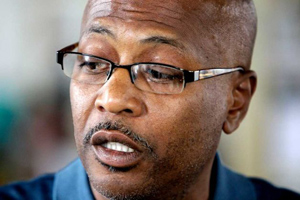
John Thompson was reportedly just weeks away from execution when his lawyers unearthed proof that prosecutors had withheld evidence, including eyewitness reports pointing to a suspect that did not look like Mr. Thompson and blood tests that established he wasn't at the scene. |
The money had been awarded to John Thompson, who spent 18 years in prison, including 14 years on death row, for a 1984-armed robbery and a murder conviction. He was reportedly just weeks away from execution when his lawyers unearthed proof that prosecutors had withheld evidence, including eyewitness reports pointing to a suspect that did not look like Mr. Thompson and blood tests that established he wasn't at the scene.
Prosecutors dropped the robbery charges in 1999 and a state court exonerated him of the murder in a separate trial in 2003.
Mr. Thompson then sued New Orleans former District Attorney Harry F. Connick for withholding evidence that could have resulted in an acquittal and failing to properly train prosecutors. Mr. Thompson was awarded $14 million in damages in a civil suit, but the prosecutor's office appealed the verdict and the case wound up before the high court.
On behalf of the majority, Justice Clarence Thomas said there was an “absence of proof” that such prosecutorial misconduct was a regular occurrence in the New Orleans district attorney's office or that it was a result of insufficient training.
“By their own admission, the prosecutors who tried Thompson's armed robbery case failed to carry out (justice),” Mr. Thomas wrote in the opinion. “But the only issue before us is whether Connick, as the policy maker for the district attorney's office, was deliberately indifferent to the need to train the attorneys under his authority.”
In a concurring note, Justice Antonin Scalia singled out assistant district attorney Gerry Deegan as the only “miscreant prosecutor” who suppressed information.
Chief Justice John G. Roberts Jr. and Justices Anthony M. Kennedy and Samuel A. Alito Jr. also joined Thomas' opinion.
But in a dissenting opinion, supported by Justices Stephen G. Breyer, Sonia Sotomayor. and Elena Kagan, Justice Ruth Bader Ginsburg wrote that “no fewer than five prosecutors” were involved in a violation of Mr. Thompson's constitutional rights. “They kept from him, year upon year, evidence vital to his defense.”
Their actions, Justice Ginsberg said in the first dissenting opinion to be read from the bench in the term of the court, were “a foreseeable consequence of lax training.”
Current New Orleans District Attorney Leon A. Cannizzaro Jr. praised the court's decision at a news conference, saying his office “should not be held financially responsible for the intentional, unethical and illegal acts of a rogue prosecutor,” according to The New York Times.
The office would have had to shell out what now totals nearly $20 million to pay the judgment and interest accumulated in the years since the original ruling.
Mr. Thompson harshly criticized the decision.
“If I'd spilled hot coffee on myself, I could have sued the person who served me the coffee,” he toldThe New York Times. “But I can't sue the prosecutors who nearly murdered me.”
No comments:
Post a Comment